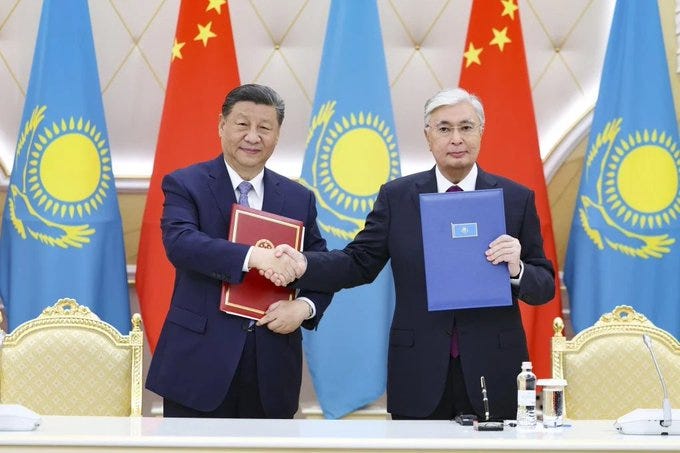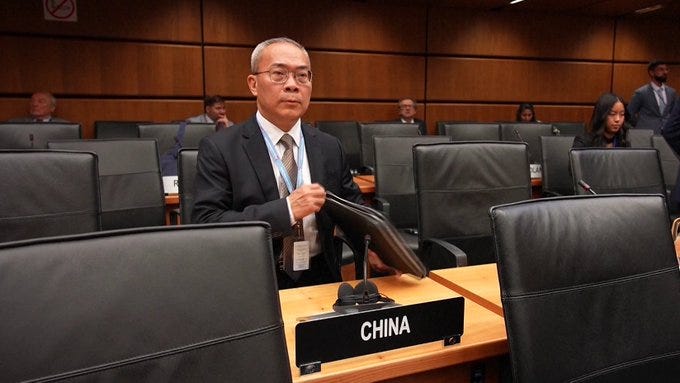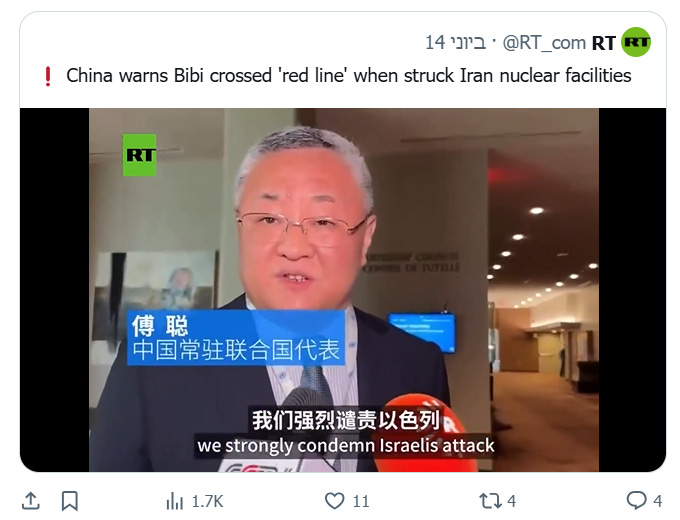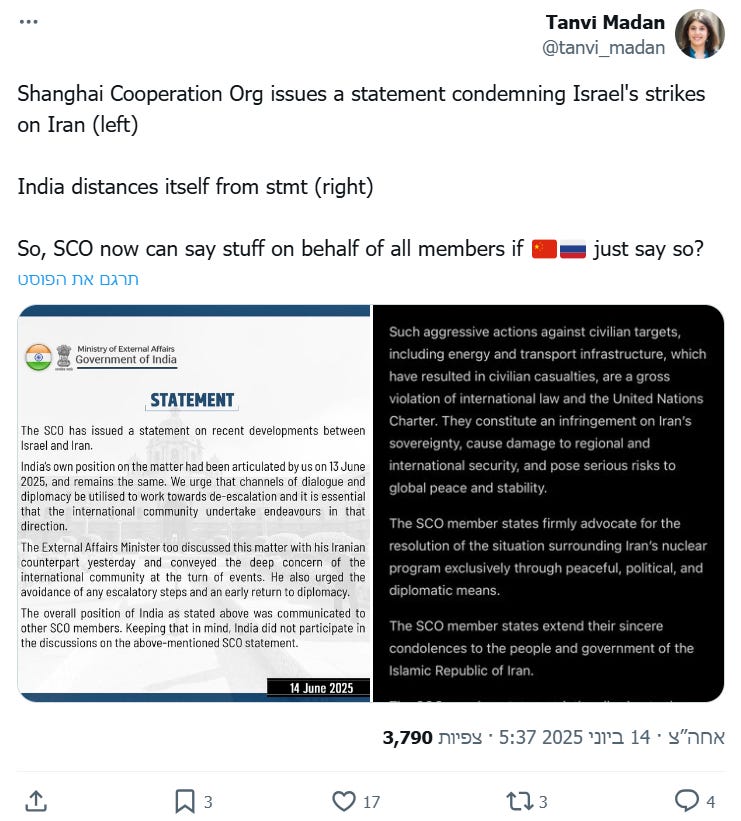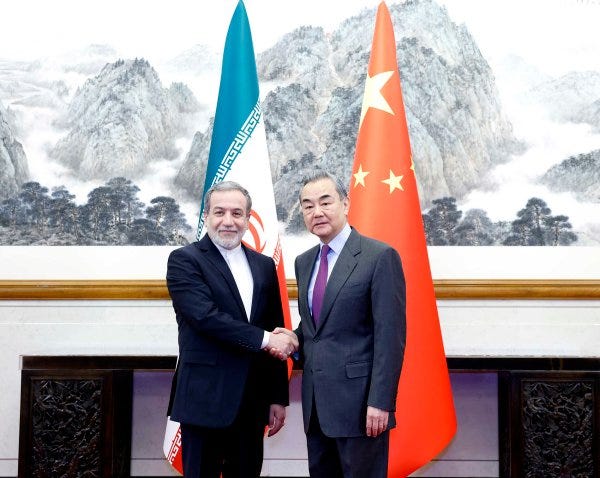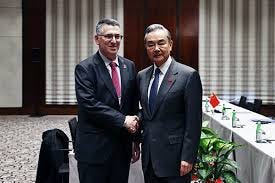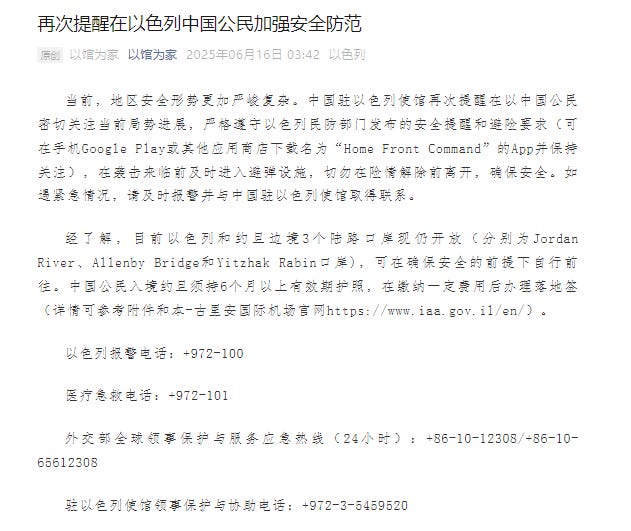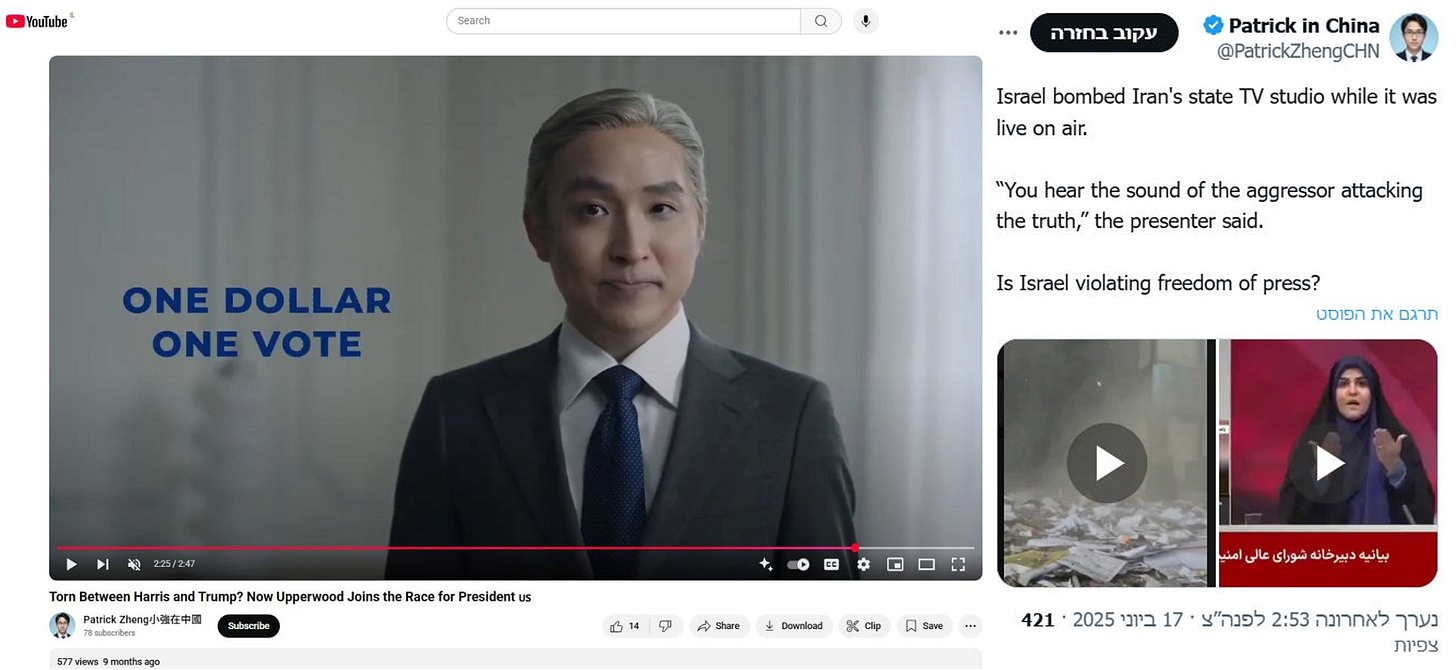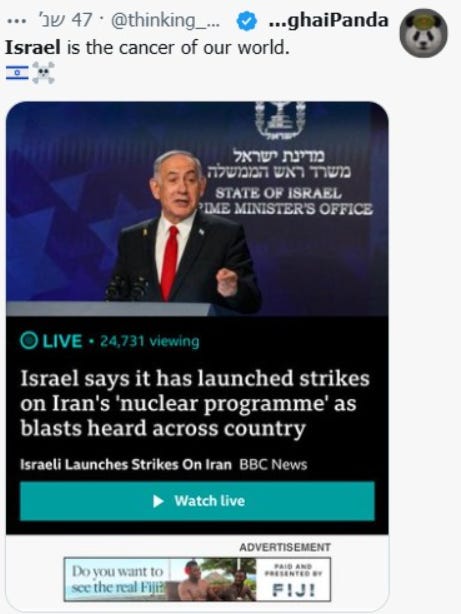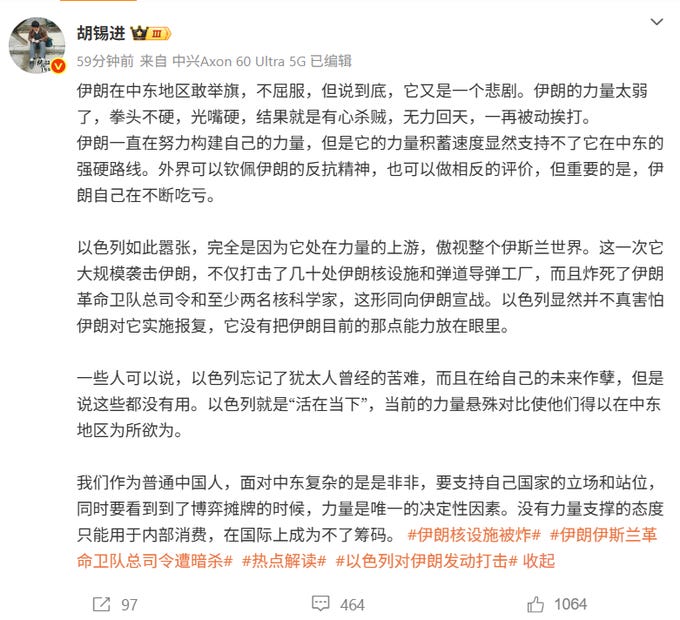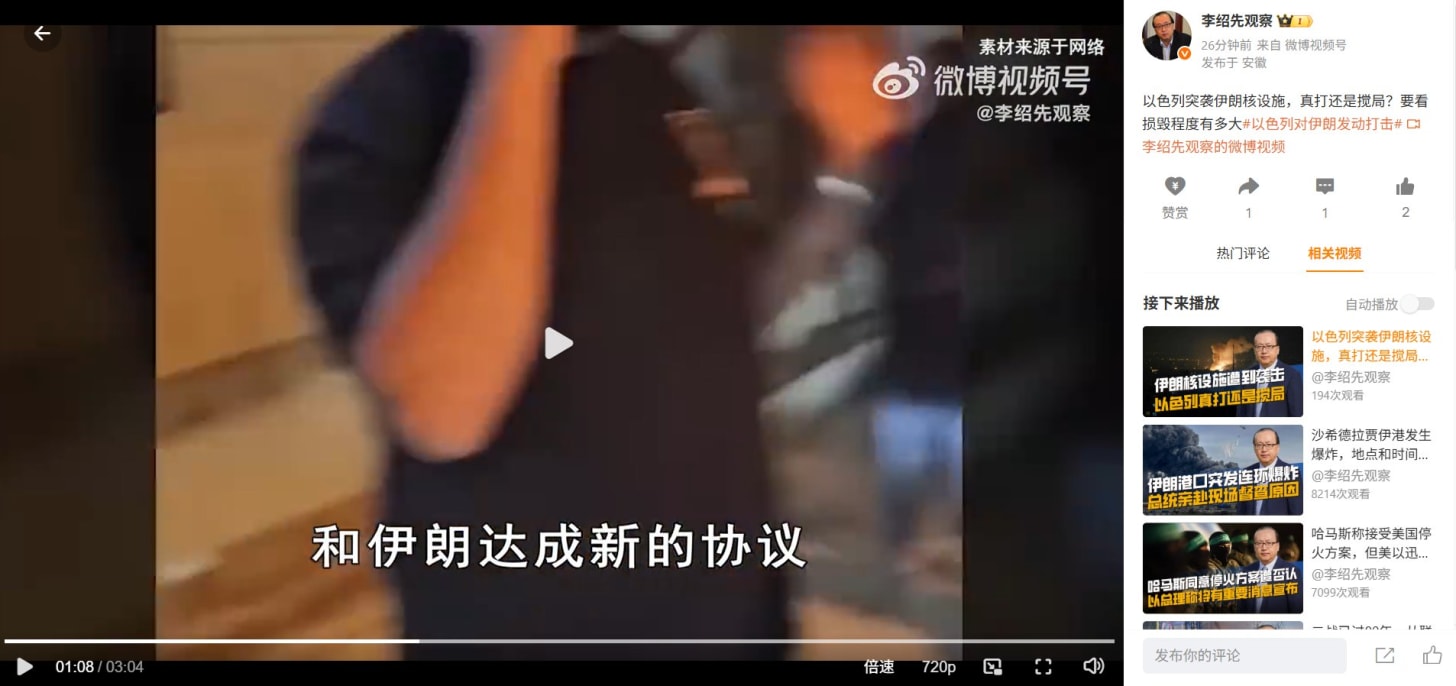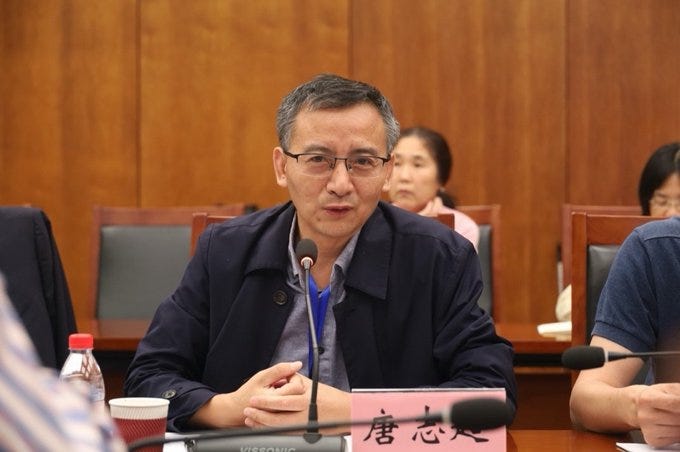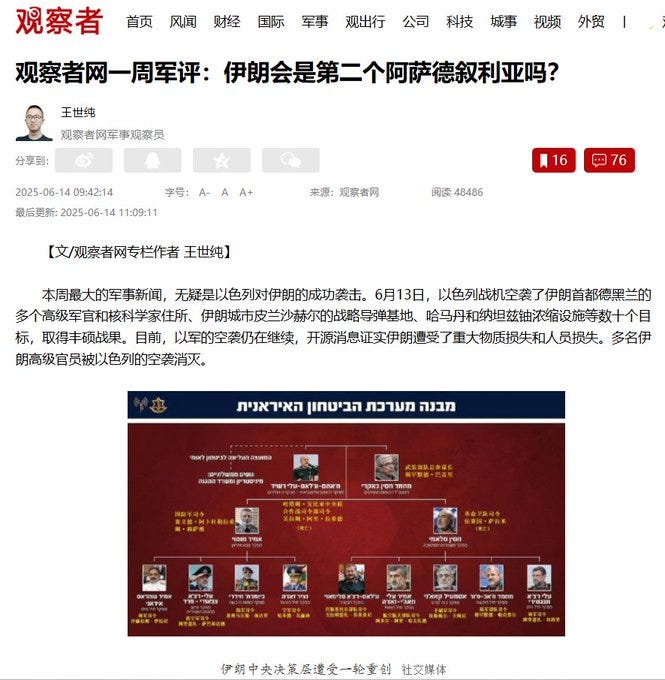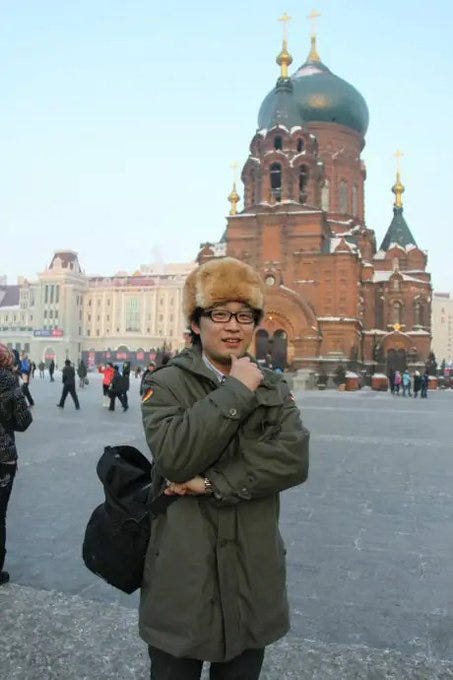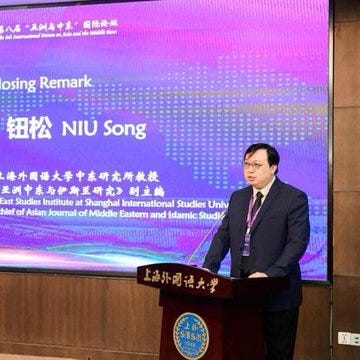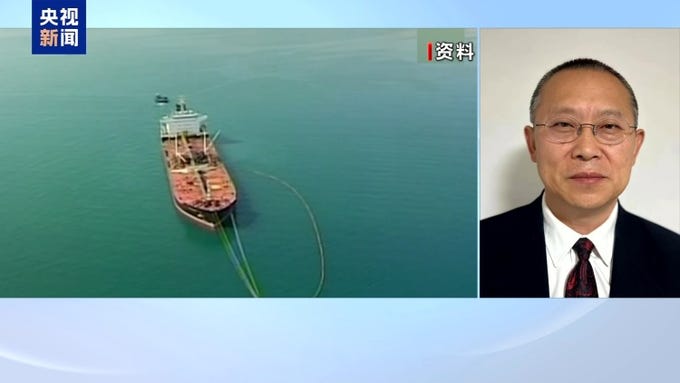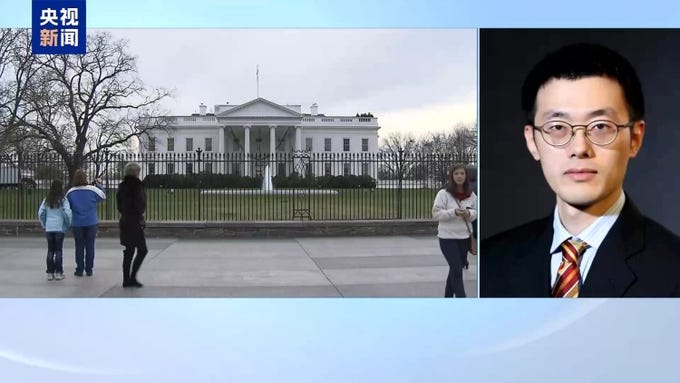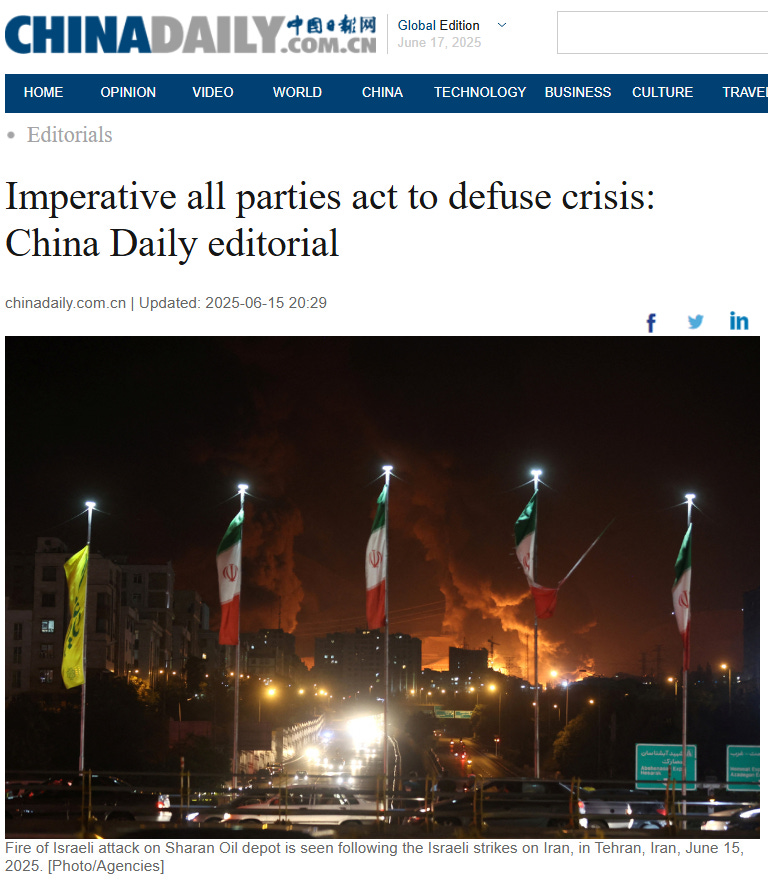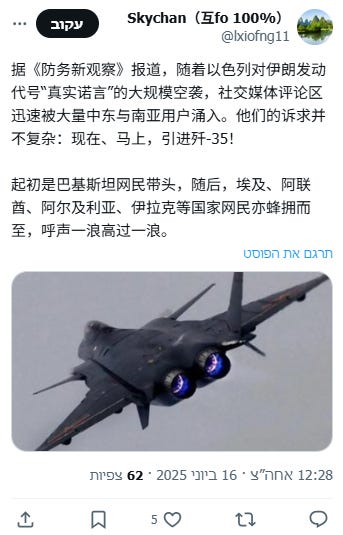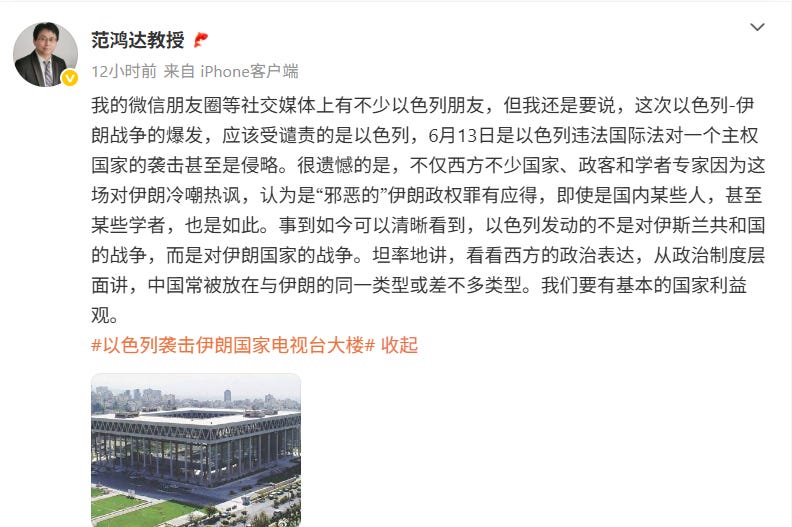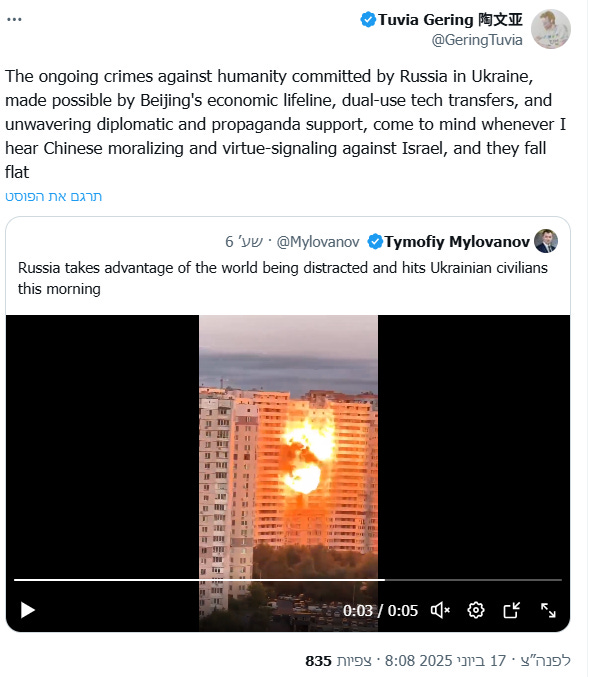Greetings from Jerusalem,
Since Friday, I’ve been sharing a steady stream of translations and commentary on X/Twitter in response to the unfolding war. You can follow my coverage here (@geringtuvia).
This newsletter is divided into two sections:
Authoritative reactions.
Semi- or non-authoritative reactions.
The VERY LONG compilation took considerable time and effort to translate, edit, and prepare, some of it while under fire. If you find it valuable, I would deeply appreciate it if you could share it and mention Discourse Power to support my work.
Usually, I translate everything manually, but due to time constraints, most of the translations below were made using ChatGPT 4o. I read the original Chinese to ensure accuracy and edited the text where needed.
Fifty-three hostages remain in Gaza. Fewer than two dozen are still alive; the rest were murdered in captivity. We continue to hope for their release and for a return to more peaceful times.
Thank you for reading,
Tuvia
But first, earlier today (2025.06.17), Xi Jinping issued his first statement on the war. The language is very balanced with no condemnation of Israel.
Translated from Xinhua (emphasis added):
“On June 17 local time, during the Second China–Central Asia Summit in Astana, Chinese President Xi Jinping met with President Mirziyoyev of Uzbekistan. The two heads of state exchanged views on the current situation in the Middle East. Xi Jinping stated that Israel's military action against Iran has caused a sharp escalation in tensions across the Middle East and that China is deeply concerned about this development.
“He emphasized that China opposes any actions that infringe upon the sovereignty, security, and territorial integrity of other countries [Israel included]. Military conflict is not a solution, and rising tensions in the region do not serve the common interests of the international community.
“All parties should work to de-escalate the conflict as soon as possible and avoid further deterioration. China stands ready to work with all parties to play a constructive role in restoring peace and stability in the Middle East.
TG: “But aren’t they Comprehensive Strategic Partners? What about the 25-year deal?!”
Bupkis. As other analysts and I have argued for years, there's no "Axis of Evil," there is no alliance - just a transactional partnership of convenience (and shared resentment of "US-led Western hegemony") between the oddest of bedfellows.
Syria was once a strategic partner of Beijing as well, that is, until it collapsed, and China didn’t lift a finger to help Assad.
That is not to say that China isn't doing or won't do anything for Iran. Much will depend on how the situation plays out on the battlefield, as well as how the US responds.
Authoritative Reactions (organized chronologically):
2025.06.12 For the first time in 20 years, the IAEA Board of Governors ruled Iran is violating nuclear oversight obligations. 19 countries backed the resolution; Russia, China (and Burkina Faso) opposed, protecting their Iranian beneficiary. 11 states, including India & Brazil, abstained
TG: China officially supports the global non-proliferation regime and is party to the NPT, but it seems like its strategic alignment with Iran and Russia now takes precedence over its commitment to global nuclear governance.
💥💥💥Israel attacks Iran on Friday morning, June 13, 2025, at 2:30 a.m.💥💥💥
2025.06.13 Chinese representative: Political and diplomatic efforts are the only correct way to resolve the Iranian nuclear issue
Li Song, China's permanent representative to the International Atomic Energy Agency, said that political and diplomatic efforts are the only correct way to properly resolve the Iranian nuclear issue.
According to reports from Xinhua News Agency and Reuters, the Board of Governors of the United Nations International Atomic Energy Agency (IAEA) passed a resolution in Vienna on Thursday (June 12), determining that Iran has failed to fulfill its nuclear non-proliferation obligations.
Chinese representative Li Song pointed out in his speech at the meeting that the Iranian nuclear issue has been delayed for more than 20 years. The most valuable historical experience is that political and diplomatic efforts are the only correct way to properly resolve the Iranian nuclear issue; the most important historical lesson is that blindly confronting, exerting pressure and undermining international agreements will only further complicate the issue.
Li Song also said that if the United States had not unilaterally withdrawn from the Iran nuclear deal, and if the deal could be implemented smoothly and effectively, the Iranian nuclear issue would not have reached its current point. The Iranian nuclear issue is currently at an important crossroads, and it is imperative that the international community work together to promote political and diplomatic contacts and dialogues based on mutual respect, abandon sanctions, pressure, and threats of force, and jointly promote relevant parties to reach a new consensus based on the comprehensive agreement on the Iranian nuclear issue.
He believes that the international community should encourage the parties concerned in the Iranian nuclear issue to reach a solution that takes into account the reasonable concerns of all parties through dialogue and negotiation. Under the current circumstances, we should cherish the status and role of the Treaty on the Non-Proliferation of Nuclear Weapons as the cornerstone of the international nuclear non-proliferation system.
2025.06.13 MFA Spokesperson Lin Jian
In response to a media inquiry regarding Israel’s launching attacks on multiple targets inside Iran early this morning, Chinese Foreign Ministry spokesperson Lin Jian said on Friday that China is highly concerned about Israel’s attacks on Iran and deeply worried about the potential serious consequences of these actions. China opposes any violation of Iran’s sovereignty, security, and territorial integrity, and opposes actions that escalate tensions and expand the conflict. The renewed sharp escalation of the regional situation is not in the interest of any party, said Lin.
2025.06.13 During the IAEA Board of Governors meeting over Israel's attack on Iran's nuclear facilities, China condemned Israel's military action against Iran and reiterated its opposition to armed attacks on peaceful nuclear facilities, said Li Song, China's permanent representative to the IAEA, Xinhua reported on Friday.
TG: Li Song condemned Israel for striking Iran’s "peaceful" nuclear sites, but had voted with Russia the other day against the IAEA finding Iran in breach of non-proliferation. “Let the one who tied the bell on the tiger’s neck untie it” 解铃还是系铃人
2025.06.13 MFA: Remarks on the Situation in the Middle East by Ambassador Fu Cong at the UN Security Council Briefing
President,
Thank you for convening this emergency meeting. I thank Director General Rafael Mariano Grossi and Under-Secretary-General Rosemary DiCarlo for their briefings.
Early this morning, Israel launched large-scale attacks on multiple targets in Iran, causing damage to Iran's nuclear facilities and casualties. The Israeli side said that its military operations would last as many days as it takes. China condemns Israel's actions that violate Iran's sovereignty, security, and territorial integrity, opposes the intensification of tensions and the expansion of conflicts, and is deeply concerned about the potential grave consequences of the Israeli operations. The abrupt heating-up of the region serves no one's interests. We urge Israel to immediately cease all military adventurism and avoid further escalating tensions. We call on all relevant parties to abide by the UN Charter and international law, resolve disputes through political and diplomatic means, and jointly maintain regional peace and stability.
China is seriously concerned about the negative impact of the current developments on the diplomatic negotiations on the Iranian nuclear issue. China has always been committed to peacefully resolving the Iranian nuclear issue through dialogue and negotiation. We oppose the use of force and illegal unilateral sanctions, and oppose armed attacks on peaceful nuclear facilities. As a State Party to the Treaty on the Non-Proliferation of Nuclear Weapons (NPT), Iran's right to the peaceful uses of nuclear energy should be fully respected.
President,
For some time now, conflicts in the Middle East have dragged on, and the regional situation has remained highly tense. Gaza has been subjected to prolonged attacks and blockades, with over two million people trapped in an unprecedented humanitarian disaster. The international community should work together to promote a ceasefire in Gaza, deescalate the regional situation, and effectively curb the spread of conflict. The country with significant influence over Israel should effectively play a constructive role. The Security Council should make full use of all the means conferred on it by the Charter to ensure the implementation of its relevant resolutions and to play its due role in maintaining regional peace and security.
I thank you, President.
TG: So China's UN rep Fu Cong has the gall to condemn Israel for “violating Iranian sovereignty.” Let's talk about sovereignty, shall we?
After Iran’s unprecedented missile and barrage on Israel in April 2024, China’s top diplomat Wang Yi “appreciated” Tehran for not targeting neighboring countries. Tehran launched over 300 drones and missiles, deliberately targeting civilian population centers inside Israel, and China’s response was to offer Iran gratitude.
Where was China’s condemnation when Iran helped coordinate Hamas’s barbaric October 7 massacre? When it armed Hezbollah, the Houthis, and militias across Iraq and Syria, all of whom have been attacking Israel ever since, with one purpose: to destroy it.
And what about Iran’s nuclear program? The IAEA has reported serious violations of the Non-Proliferation Treaty, including enriched uranium far beyond civilian thresholds. But when it came time to hold Iran accountable, China (and Russia) voted against the resolution.
Despite US and international sanctions, China continues to funnel tens of billions of dollars into Iran’s economy through illicit oil purchases. Up to half of that revenue, according to Reuters, goes directly into the coffers of the IRGC, Iran’s terror command center.
And this year alone, not once, but at least three times, sanctioned Iranian ships carried from China to Iran thousands of tons of sodium perchlorate, which is a rocket fuel precursor used in missiles.
No doubt intended for the same missiles Iran and its proxies have been raining down on civilian homes from Gaza to Kiryat Shmona since October 7. And in the last 12 hours, Iran targeted Israeli cities, not military bases, with civilians injured and killed.
Will China condemn that? Or is sovereignty only sacred when it belongs to terror regimes and their Russian comrades? Beijing isn’t defending sovereignty; it’s defending its client state.
2025.06.14 India Today: India on Saturday distanced itself from a statement issued by the Shanghai Cooperation Organisation (SCO) condemning Israel's strikes on Iran, stating that it did not participate in the discussions on the statement.
The SCO, a China-led regional bloc comprising member states including China, Iran, Kazakhstan, Kyrgyzstan, Pakistan, Russia, Tajikistan, Uzbekistan, Belarus, and India, had "strongly condemned" the Israeli military strikes on Iranian territory under Operation Rising Lion.
The SCO, a China-led regional bloc comprising member states including China, Iran, Kazakhstan, Kyrgyzstan, Pakistan, Russia, Tajikistan, Uzbekistan, Belarus, and India, had "strongly condemned" the Israeli military strikes on Iranian territory under Operation Rising Lion.
It added: "Such aggressive actions against civilian targets, including energy and transport infrastructure, which have resulted in civilian casualties, are a gross violation of international law and the United Nations Charter. They constitute an infringement on Iran's sovereignty, cause damage to regional and international security, and pose serious risks to global peace and stability."
India, however, reiterated its own position on the matter. The Ministry of External Affairs issued a clarification on SCO's statement, stating, "India's position on the matter had been articulated by us on 13 June 2025, and remains the same. We urge that channels of dialogue and diplomacy be utilised to work towards de-escalation, and it is essential that the international community undertake endeavours in that direction."
2025.06.14 MFA: Wang Yi Holds Phone Call with Iranian Foreign Minister Araghchi
TG: Below is the full CN transcript of Wang's phone call with his Iranian counterpart. If China had taken the same stance with Russia over Ukraine, Wang’s words might carry some credibility. But just as it shields Moscow, Beijing now defends another client state, defenestrating irony in the process.
Full translation of Chinese transcript:
On June 14, 2025, Wang Yi, member of the Political Bureau of the Communist Party of China (CPC) Central Committee and Minister of Foreign Affairs, held a phone call with Iranian Foreign Minister Abbas Araghchi.
Araghchi provided an update on the latest developments in the regional situation, stating that Israel had recently launched a blatant attack on Iran, resulting in casualties among Iranian military personnel and civilians. He emphasized that the attack on Iran’s nuclear facilities constituted a grave violation of international law. Israel’s military actions are extremely dangerous and could drag the entire region into a full-scale war. He expressed hope that the international community would speak with one voice to demand Israel cease its military operations. Araghchi thanked China for its consistent understanding and support of Iran’s position and expressed confidence that China would play an increasingly important role in promoting regional peace and stability.
Wang Yi stated that following Israel’s attack on Iran, China had immediately made its position publicly clear. China firmly condemns Israel’s violation of Iran’s sovereignty, security, and territorial integrity. It resolutely opposes the violent attacks on Iranian officials that resulted in civilian casualties and supports Iran in defending its national sovereignty, protecting its legitimate rights and interests, and ensuring the safety of its people. Israel’s actions seriously violate the principles and purposes of the UN Charter and the fundamental norms governing international relations. In particular, the strike on Iran’s nuclear facilities sets a dangerous precedent and could lead to catastrophic consequences. China supports the international community in upholding justice and speaking out promptly. China also urges countries with influence over Israel to take concrete steps to help restore peace.
Wang Yi stressed that the regional situation is now at a critical and pivotal juncture. China is willing to maintain communication with Iran and other relevant parties and continue to play a constructive role in de-escalating tensions. He expressed hope that the Iranian side would ensure the safety of Chinese institutions and personnel. Araghchi responded that Iran is willing to stay in close contact with China and will make every effort to guarantee the safety of Chinese institutions and personnel.
2025.06.14 MFA: Wang Yi Holds Phone Call with Israeli Foreign Minister Gideon Sa'ar
Full translated transcript:
On June 14, 2025, Wang Yi, member of the Political Bureau of the Communist Party of China (CPC) Central Committee and Minister of Foreign Affairs, held a phone call with Israeli Foreign Minister Gideon Sa’ar.
After listening to Sa’ar’s briefing on Israel’s views regarding the current situation and its position, Wang Yi stated that China has consistently advocated that all international disputes should be resolved through dialogue and consultation, and opposes the use of force or sanctions. In this light, China clearly opposes Israel’s use of force in violation of international law to attack Iran, particularly at a time when the international community is still seeking a political solution to the Iranian nuclear issue. Such actions are especially unacceptable. Both Israel and Iran are important countries in the Middle East, and the relationship between them affects the region’s overall peace and stability. The immediate priority is to take steps to prevent further escalation of the conflict and avoid plunging the region into greater turmoil. Returning to the track of resolving issues through diplomatic means is also the broad consensus of the international community.
Wang Yi briefed Sa’ar on his recent phone call with Iranian Foreign Minister Araghchi, emphasizing that the Middle East cannot remain perpetually in the shadow of conflict, and that Israel should not continue living with the constant anxiety of war. Diplomatic efforts regarding the Iranian nuclear issue have not been exhausted, and a peaceful resolution remains possible. Force cannot bring lasting peace; only by embracing the concept of common security can the legitimate concerns of all parties be genuinely addressed.
China, Wang continued, has always approached and handled regional hotspots based on the merits of each case, and urges both Israel and Iran to resolve their differences through dialogue and seek a path toward peaceful coexistence. China is willing to play a constructive role in this regard.
Wang Yi expressed hope that the Israeli side will take concrete steps to ensure the safety of Chinese institutions and personnel. Sa’ar responded that Israel has always valued and will continue to ensure the security of Chinese institutions and personnel.
2025.06.14 Israeli Foreign Ministry readout of Wang Yi
Foreign Minister @gidonsaar just spoke with Chinese Foreign Minister Wang Yi. Minister Sa'ar detailed the reasons behind the Security Cabinet’s decision to remove the Iranian threat to annihilate Israel. Minister Sa’ar outlined Iran’s progress in its nuclear and missile programs, its plans for the elimination of Israel, and its direct and proxy attacks against Israel. Minister Sa’ar stated that the decision was made “at the last possible minute.” He emphasized that while Israel targets military objectives and sites related to the nuclear program, Iran deliberately targets civilians in Israel. Chinese Foreign Minister Wang Yi presented his country’s position during the call. The two agreed to remain in contact.
2025.06.16 3rd travel warning by the Chinese embassy in Israel [first was published on Friday]
The Chinese Embassy in Israel once again reminds Chinese nationals in the country to closely monitor ongoing developments and strictly follow safety alerts and emergency instructions issued by the relevant Israeli authorities.
For updates, individuals are advised to download the “Home Front Command” app from Google Play or other app stores. Currently, three land border crossings between Israel and Jordan remain open: the Jordan River Crossing, the Allenby Bridge, and the Yitzhak Rabin crossings.
Travelers may proceed to these points at their discretion, provided it is safe to do so. Chinese citizens entering Jordan must carry a passport valid for at least six months and can obtain a visa on arrival upon payment of the required fee, according to a notice released by the Chinese Embassy in Israel via its WeChat account on Monday.
2025.06.17 The Chinese Embassy in #Iran released a notice on Monday saying that it has coordinated with Iranian authorities to provide exit facilitation, advising Chinese nationals in Iran to depart via land border crossings as soon as possible and designating the Razi, Nordooz, Astara, and Bajgiran border crossings as priority routes. The embassy also said that the Iran-Israel conflict is escalating in scale and intensity, with the security situation continuing to deteriorate and the rising risk of the situation spiraling out of control, warning of a potential closure of Iran's land border crossings in the near future.
2025.06.16 MFA: Guo Jiakun, regular press conference
[Pretty balanced comments from the regular press conference of the PRC Foreign Ministry (the bar is pretty low after Oct 7, but still):]
Iraqi Rudaw Mbreakedia Network: "When Foreign Minister Wang Yi spoke with the foreign ministers of Iran and Israel, he stated that targeting nuclear facilities is a dangerous development. Does China believe there is a risk of the conflict expanding or escalating into a broader war? What measures is China taking to prevent the war from spreading to other Middle Eastern countries?"
Guo Jiakun: "China is deeply concerned about Israel's attacks on Iran and the sudden escalation into military conflict. We call on all parties to immediately take action to de-escalate tensions as quickly as possible and to create the conditions necessary to return to the path of resolving issues through dialogue and negotiation.
"If the conflict between Israel and Iran continues to escalate or even expand, countries in the Middle East will be the first to suffer. Foreign Minister Wang Yi has already spoken by phone with Iranian Foreign Minister Araghchi and Israeli Foreign Minister Sa’ar, urging both sides to resolve their differences through dialogue. All relevant parties must immediately take steps to break the escalation and cool down tensions.
"I want to emphasize that force cannot bring lasting peace. All international disputes should be resolved through dialogue and consultation. Only by embracing the concept of common security can the legitimate concerns of all sides be addressed at their root. China will continue to maintain communication with the relevant parties, promote peace, and facilitate dialogue to prevent further turmoil in the region."
2025.06.17 Chinese Embassy in Israel’s WeChat account: “Chinese Embassy in Israel hereby calls on 提醒 all Chinese citizens in the country to depart as soon as possible via land border crossings, provided they can ensure their safety. It is recommended to prioritize the Jordanian route.”
Amid the ongoing escalation of the Israel-Iran conflict, there has been significant damage to civilian infrastructure and a continuous rise in civilian casualties, further worsening the security situation.
In recent days, many Chinese citizens in Israel have contacted the Embassy via phone or email to ask when the airport will reopen or when Hainan Airlines will resume flights. According to current information, Israeli airspace remains closed, and the Israeli government has extended the nationwide state of emergency until June 30.
At the same time, the relevant Israeli authorities have emphasized that land border crossings with Jordan and Egypt remain open.
The Chinese Embassy in Israel hereby calls on all Chinese citizens in the country to depart as soon as possible via land border crossings, provided they can ensure their safety. It is recommended to prioritize the Jordanian route.
2025.06.17 “Regardless of the justification, targeting media institutions with firepower crosses the bottom line of civilization” - The All-China Journalists Association (ACJA) issued a statement on June 17, strongly condemning the Israeli bombing of the headquarters of the Islamic Republic of Iran Broadcasting (IRIB) in Tehran.
TG: The ACJA is not any regular professional press organization, but rather a United Front body under the CCP Propaganda Department that acts as a key instrument of Party control over China's media and its million-plus registered journalists, rewarding compliance while punishing dissent. Understanding IRIB's role explains why a media association in the world's leading jailer of journalists would show solidarity.
IRIB is a key component of the Iranian regime's state propaganda and global Shi'ite indoctrination apparatus, and it has helped the Iranian Armed Forces by disguising military messaging as civilian media content. The network has also been complicit in broadcasting forced confessions, often extracted under torture from political prisoners and protesters, and plays a central role in suppressing dissent and justifying state violence.
Yesterday marked the birthday of Majidreza Rahnavard, the first person publicly executed in connection with the Mahsa Amini protests. A now-iconic video (see image) captures him blindfolded and flanked by regime agents in an IRIB studio, where he was coerced into confessing just hours before his execution. His final words were: “I don’t want Quran to be read or prayed on my grave, just celebrate.”
If there is a “bottom line of civilization”, it was crossed long before the first missile struck IRIB.
2025.06.17 In a similar vein, self-described journalist Patrick Zheng from the state-run news agency Xinhua, who stars (literally and figuratively) in anti-US propaganda campaigns, poses an innocent question about Israel’s attack
2025.06.17 The Chinese Foreign Ministry’s daily press conference was also relatively balanced (the spokesperson didn’t fall into the traps set by the Turkish journalist, who seems to hate Israel even more than Iran, judging by his questions). Machine translation:
Anadolu Agency Reporter: U.S. President Donald Trump posted on Truth Social that “everyone should immediately evacuate Tehran” due to Israel’s continued strikes on the Iranian capital. He also urged Iran to sign a nuclear deal. What is China’s comment on this? How does China view the U.S.’s one-sided approach of condoning Israeli attacks on Iranian territory?
Guo Jiakun: The renewed flare-up in the Middle East serves no party’s interests. Fanning the flames and exerting threats or pressure does not help de-escalate the situation; it only deepens tensions and broadens the conflict. China urges all relevant parties—especially those with significant influence over Israel—to shoulder their responsibilities, take immediate steps to reduce tensions, and prevent the conflict from spiraling further.
Anadolu Agency Reporter: During its military operation against Iran, the Israeli army struck the building of Iran’s national broadcaster. Israeli Defense Minister Katz previously declared that Iran’s radio and broadcast facilities would be wiped out. The Committee to Protect Journalists has condemned this strike, and Iran has called it a “criminal act” and a “war crime.” What is China’s response?
Guo Jiakun: China is deeply concerned about the escalating conflict between Israel and Iran. We once again urge all parties to take immediate action to defuse tensions and prevent the region from descending into greater turmoil. A ceasefire and an end to hostilities are urgent priorities; only through dialogue and negotiation can lasting peace be achieved. China stands ready to maintain close communication with all parties and play a constructive role in easing the situation.
Anadolu Agency Reporter: Will China take the initiative to mediate diplomatically in the Israel-Iran conflict? Given that Iran is a member of both the Shanghai Cooperation Organization and BRICS, will these multilateral bodies take further joint action?
Guo Jiakun: Since the outbreak of the conflict, China has maintained communication with Iran, Israel, and other relevant parties, promoting ceasefire and de-escalation. Relevant international organizations have also issued statements regarding the current situation.
Let me stress: military force cannot bring lasting peace. All international disputes should be resolved through dialogue and negotiation. Embracing a concept of collective security is the only way to address legitimate concerns. China will continue to engage with relevant parties, mediate to encourage peace talks, and help prevent further regional instability.
Anadolu Agency Reporter: As the Israel-Iran conflict intensifies and Israel targets Iranian energy facilities, is China concerned about disruptions to its energy imports from Iran?
Guo Jiakun: China is deeply concerned about Israel’s attacks on Iran and the resulting sudden escalation of regional conflict. The urgent task now is for all parties to take immediate action to ease tensions, prevent greater regional upheaval, and create conditions for a return to negotiations and peaceful resolution.
Shenzhen Satellite TV Reporter: On June 16, the foreign ministers of 21 Arab and Islamic countries—including Egypt, Jordan, the UAE, Pakistan, Bahrain, Turkey, Algeria, Saudi Arabia, Sudan, Iraq, Oman, Qatar, and Kuwait—issued a joint statement on the Israel-Iran conflict. They called for respect for sovereignty and territorial integrity, adherence to the principle of good-neighborliness, and peaceful resolution of disputes. What is China’s comment?
Guo Jiakun: Israel’s attack on Iran has led to a sharp escalation in regional tensions, drawing close attention from the international community. The immediate priority is to halt the fighting, take effective steps to prevent further escalation, and steer the region back onto the path of dialogue and political resolution. This is the broad consensus of the international community. China welcomes the joint statement issued by Egypt and other Arab and Islamic countries and appreciates their efforts to ease tensions. China is willing to maintain communication with all parties and play a constructive role in promoting de-escalation.
Semi- or Non-Authoritative Reactions (ordered chronologically)
💥💥💥Israel attacks Iran on Friday morning, June 13, 2025, at 2:30 a.m.💥💥💥
2025.06.13 Wang Jin via Weibo: Israel Strikes Iran Under a Strategy of Brinkmanship
Dr. Wang Jin is an associate professor and assistant director of the Institute of Middle East Studies at Northwest University of China. Excerpt:
Israel’s military action demonstrates its intent to maintain high-pressure tactics and seize strategic initiative through the so-called brinkmanship mindset, using this approach to exert pressure on Iran.
However, Israel’s risky moves could very well lead to strategic consequences beyond its control. If Iran assesses that the current military action warrants a strong counterstrike, it could plunge the entire region into another round of conflict and heighten the risk of war escalation.
The trajectory of future developments depends on how Iran evaluates the losses incurred from this round of attacks and its strategic outlook. Considering Iran’s two rounds of military retaliation against Israel in April and October 2024, this latest response may be larger in scale and more forceful. As a result, the risk of full-scale war in the Middle East could further intensify.
2025.06.13 Initial response from China Daily, an English-language platform directly subordinate to the Propaganda Department of the CCP
Israel's air strikes against Iranian nuclear facilities early Friday, before a critical round of talks between the United States and Iran may lead to serious consequences and stroke extended conflicts across the region.
2025.06.13 First reactions from a Spamouflage account, a multi-year coordinated disinformation campaign on Western social media attributed to the Ministry of Public Security (MPS).
Full translation: “The Iranian intelligence services held a silent and grim press conference. A set of highly classified documents was slowly revealed under the flash of cameras, their contents as sharp as blades, tearing through the façade of the international order.
“Iranian authorities confirmed: the International Atomic Energy Agency (IAEA) had long been infiltrated by Israel’s Mossad and was involved in planning a series of assassinations targeting Iranian nuclear scientists.
“Shocking!“
Same day ShanghaiPanda (@thinkingPanda): This unaffiliated account has been active for years on Western and Chinese social media and is regularly retweeted by official Chinese accounts and CCP-affiliated media outlets:
2025.06.13 Ding Long via Jiefang Daily: US-Iran nuclear talks collapse amid Israeli strikes, but future revival possible if tied to ceasefire.
Professor Ding Long of the Middle East Studies Institute (MESI) at Shanghai International Studies University (SISU) was interviewed by Jiefang Daily's Shangguan News about Israel's recent strike on Iran on June 13, 2025. The newspaper is the official daily of the Shanghai Municipal Committee of the CCP.
Excerpt:
"The US-Iran nuclear talks have hit a dead end. With Israel's attacks on Iran, the fundamental basis for negotiations has crumbled. The chances of resuming talks in the short term are slim. However, in the longer term, there may be opportunities to restart the negotiations. “If the conflict between Israel and Iran escalates, a future ceasefire negotiation may become linked to nuclear talks, paving the way for their revival."
2025.06.13 Hu Xijin via Weibo: Iran's defiance in the Middle East is undermined by its weakness; power, not principle, determines outcomes.
"Iran has long tried to build its strength...but what matters most is that Iran continues to suffer losses...As ordinary Chinese...we must support our country’s position. At the same time, we must recognize that in a showdown, power is the only decisive factor " - Hu Xijin , former editor-in-chief of Global Times, a tabloid run by CCP mouthpiece People's Daily.
Full translation of Hu's post on Weibo:
Iran dared to stand tall 敢举旗 in the Middle East and refused to submit, but at the end of the day, it is still ended in a tragedy. Iran is too weak - its fists lack power, and it relies only on tough rhetoric. The result is a desire to strike the enemy but an inability to reverse the tide, leaving it repeatedly on the defensive and suffering blows.
Iran has long tried to build its strength, but the pace of its accumulation is clearly insufficient to sustain its hardline stance in the Middle East. The outside world may admire Iran’s spirit of resistance - or criticize it - but what matters most is that Iran continues to suffer losses.
Israel’s unbridled arrogance 嚣张 stems entirely from its superior strength, allowing it to look down 傲视 on the entire Islamic world. This time, it launched a massive strike on Iran, hitting dozens of nuclear facilities and ballistic missile factories, and killing the IRGC commander and at least two nuclear scientists. This is tantamount to a declaration of war. Clearly, Israel is not truly afraid of Iranian retaliation. It doesn’t take Iran’s current capabilities seriously.
Some may say that Israel has forgotten the past suffering of the Jewish people and is sowing the seeds of future disaster. But saying this is pointless. Israel lives "in the moment," and the stark disparity in power allows it to act with impunity in the Middle East.
As ordinary Chinese people, when facing the complexities and rights and wrongs of the Middle East, we must support our country’s position. At the same time, we must recognize that when the game reaches a showdown, power is the only decisive factor. A stance without power behind it is only good for domestic consumption; it cannot become leverage on the international stage.
2025.06.13 Li Shaoxian: “The scale and impact of this attack remain unclear to all observers. Only by clarifying these dimensions can we judge whether this was a genuine strike or merely an attempt to disrupt the nuclear talks.”
Li Shaoxian is the director of the China-Arab Research Institute at Ningxia University and a former vice president of the Ministry of State Security-linked CICIR.
In a newly uploaded interview, Li stated that if Israel indeed struck the Natanz Nuclear Facility and the Fordow Fuel Enrichment Plant, it signals a determination to go all the way. For him, whether the United States was informed in advance is irrelevant, because if Iran retaliates, the U.S. will inevitably be drawn in, at the very least to intercept the response.
2025.06.13 Liu Zhongmin: “When negotiations failed to achieve the goal of nullifying Iran's nuclear capabilities, the US decided that applying pressure on Iran through Israeli military strikes was an acceptable option under the circumstances."
Prof Liu Zhongmin is a senior researcher at the Middle East Studies Institute of Shanghai International Studies University (SISU) and a Vice President of the China Middle East Society (CAMES).
More excerpts from his column in The Paper:
"...this Israeli strike on Iran is a risky military action carried out at a time when Iran is in increasingly dire straits, the US capacity to restrain and manage regional developments is weakening, and Israel is no longer concerned with preserving its international image.
"In sum, this military strike differs from the previous two rounds of Israel-Iran clashes in that it is more severe in nature, larger in scale, and raises the risk of further escalation or even outright war between Iran, Israel, and the United States. It is undoubtedly a product of Israel’s increasingly radical strategic posture and a symptom of the US sharply diminished ability to control the Middle East."
2025.06.13 State-run news agency Xinhua began echoing Iran’s talking points. When you fund, arm, and vote to shield Iran at the UNSC and IAEA, the least you can do is help launder its narrative for global audiences.
Excerpt from an editorial:
"Israel's military asserted the operation was necessary to prevent Iran from developing a nuclear bomb. However, Iran has repeatedly denied seeking such arms while Israel offers no immediate proof of an imminent Iranian strike" -
2025.06.14 Yet another party-state media outlet is echoing Iranian propaganda - this time, Frontline by CGTN, which is subordinate to China Media Group, itself overseen by the CCP’s Propaganda Department.
“scarequotes” for Israel, undisputed facts for Iran.
2025.06.14 Shanghai Daily is an English-language newspaper owned by the state-run Shanghai United Media Group under the direction of the Shanghai Municipal Committee of the CCP.
The story about downing Israeli F-35s was a fake and promoted by Iranian channels. No evidence for it as of now:
2025.06.13 Tang Zhichao, one of China's foremost Middle East scholars, was asked to jot down a few words on the Israeli strike for China Daily, the propaganda department's official outlet.
Bio: Tang Zhichao, professor at the School of International Political Economy at the University of Chinese Academy of Social Sciences (UCASS) and the director of the Centre of Development and Governance in the Middle East at the Institute of West-Asian and African Studies (IWAAS), CASS. Formerly, Tang headed the Middle East research program of the Ministry of State Security (MSS)-linked China Institutes of Contemporary International Relations (CICIR).
Key excerpts (originally in English):
"While Israel has publicly argued that Iran is on the verge of developing nuclear weapons — and that failure to act now would mean missing the last chance to stop it — this narrative largely serves as a pretext for military action.
“In fact, Israel has been warning for over two decades that Iran was close to crossing the nuclear threshold. "Behind this assault lies a dual objective: first, to neutralize what it sees as the Iranian nuclear threat; and second, to escalate the conflict in hopes of fueling domestic unrest in Iran and ultimately toppling the government. From Tel Aviv's perspective, this is a rare historical window.
“Since last year, Iran and its ‘Axis of Resistance’ have suffered significant setbacks, and Israel sees an opportunity to deal a decisive blow. "If the US and Iran were to reach a new agreement allowing uranium enrichment and easing sanctions, Israel believes the long-term threat to its national security would only grow.
“In its view, the current moment — with the Trump administration more amenable to Israeli military actions — is the optimal time to strike. "Given the physical distance between the two nations and the US' reluctance to become directly involved, the likelihood of a full-scale regional war remains low — though not impossible.
"From a strategic standpoint, Israel's assault at such a critical moment in US–Iran nuclear talks is not something Washington welcomes. The move clearly undermines US diplomatic efforts and regional strategy. Yet the United States is far from an innocent bystander. "As the conflict develops, American forces in the region are expected to become increasingly involved, especially in defensive roles after Iran began its retaliation."
2025.06.13 Hu Xijin via Weibo: “As for Israel assassinating scientists, this is nothing short of terrorism. Shouldn't the Western world, which consistently denounces Hamas for terrorism, come forward and speak out now?”
Another post by court jester Hu Xijin, ex-editor-in-chief of the Global Times, a tabloid run by the CCP mouthpiece. Full translation:
“Iran has been penetrated like a sieve! The commander-in-chief of the Revolutionary Guard has been killed in a bombing, along with at least two nuclear scientists—clearly, Mossad had precise intelligence on their whereabouts. It would be hard to believe there weren’t insiders cooperating from within.
“Though Iran presents a united front and its religious ideology sets it apart from the U.S. and Israel, that hasn't stopped the massive infiltration by these two powers.
“This suggests that Iran’s hardline national strategy lacks a foundation of genuine internal unity. Iranian society is deeply fragmented, riddled with structural vulnerabilities; its so-called “unity” is only skin-deep.
As for Israel assassinating scientists, this is nothing short of terrorism. Shouldn't the Western world, which consistently denounces Hamas for terrorism, come forward and speak out now?
2025.06.13 Li Zixin, CIIS: A relatively moderate tone toward Israel by a researcher affiliated with China's Ministry of Foreign Affairs. He gave an interview to Xiakedao, a hyper-nationalist social media channel operated by the CCP mouthpiece that has been markedly hostile to Israel since October 7.
LI Zixin is an assistant research fellow at the Department for Developing Countries Studies at China Institute of International Studies (CIIS), a think-tank overseen by the Ministry of Foreign Affairs.
Xiakedao: "Will the current Iran-Israel conflict escalate into a wider regional war?
A: "It should be noted that this is dependent on Israel, which has a significant military advantage. For all parties to return to the negotiating table, Israel must limit its use of force and regain a sense of rationality. After all, a renewed flare-up in the Middle East situation serves neither party's interests".
TG: Echoing earlier comments by the MFA spokesperson/or the spokesperson echoed Li.
2025.06.13 Dong Chao, senior energy analyst at Shenwan Hongyuan, a state-owned financial services company based in Xinjiang.
" *The worst-case scenario would be Iran blocking the Strait of Hormuz, a critical global oil supply route. Roughly 17 million barrels of crude oil, plus several million barrels of natural gas and fuel oil, pass through it daily. A blockade could trigger a dramatic short-term oil price surge* " - *Dong Chao, senior energy analyst at Shenwan Hongyuan,* a state-owned financial services company based in Xinjiang.
Full translated quote of Dong from Caijing:
“Oil prices jumped sharply this morning due to the escalating geopolitical crisis in the Middle East. Iran is a major oil exporter, currently producing around 3.3 million barrels per day.
The future impact on oil prices depends on Iran’s response. If Iran limits retaliation to targeted strikes on Israeli military facilities—like in previous incidents—the situation remains relatively controllable, and prices are likely to spike and then fall back.
However, if Iran takes more extreme measures—such as closing the Red Sea—the impact will be larger.
The worst-case scenario would be Iran blocking the Strait of Hormuz, a critical global oil supply route. Roughly 17 million barrels of crude oil, plus several million barrels of natural gas and fuel oil, pass through it daily. A blockade could trigger a dramatic short-term oil price surge.
Goldman Sachs has projected that under such circumstances, oil could spike to $130–140 per barrel. So we must watch closely how Iran reacts.”
2025.06.13 “Israel's primary objective is to dismantle Iran's nuclear capabilities, thereby preserving its nuclear monopoly in the Middle East and neutralizing Iran's perceived security deterrence against Israel,” said Liu Zhongmin, a professor at the Middle East Studies Institute of Shanghai International Studies University, in an interview with the Global Times.
Similar argument below:
2025.06.13 Sun Degang (Director, Middle East Studies Center, Fudan University)
“Israel launched the attack on Iran at this moment due to multiple factors. Over the past two years, Israel has failed to effectively resolve the Gaza issue and has frequently come under attack from the Houthi movement. With declining public support, the Netanyahu government has been forced to take this risky action against Iran in order to shore up its right-wing political base and extend its own political survival.”
“This move is largely based on the unconditional support Israel receives from the United States. The 2015 Iran nuclear deal is set to expire this July, and the U.S. and Iran are currently negotiating its renewal. Fearing Iran’s potential to produce uranium enriched beyond 60%, Israel is attempting a ‘preemptive strike’ to destroy nuclear facilities in Iran and preserve its nuclear monopoly in the Middle East.”
2025.06.14 Wang Shichun, Guancha: "When 86-year-old Khamenei considers how his allies, who once dominated the Middle East for two decades, have fallen one after another and how Iran remains powerless, he might resonate with the old Chinese proverb, 'That which brought your rise may sow your fall'" - The proverb 君以此始,必以此终 is from Zuozhuan (4th century BCE).
Wang is a military columnist for Guancha.cn, a Chinese nationalist news platform founded in 2012 by billionaire Eric X. Li, a venture capitalist and political scientist educated at UC Berkeley, Stanford, and Fudan University. Li also chairs Chengwei Capital and serves as a trustee of Fudan University's China Institute, headed by Prof. Zhang Weiwei.
It’s unusual to hear criticism from a source like this leveled against China’s Comprehensive Strategic Partner and staunch anti-Western bastion.
2025.06.14 Jin Liangxiang and Han Jianwei to CCTV
CCTV’s “News+” interviewed Jin Liangxiang, Director of the Regional Security Office at the state-run Shanghai Institutes for International Studies (SIIS), and Han Jianwei, Associate Professor at the Middle East Studies Institute of Shanghai International Studies University (SISU).
Translation:
Why Did Israel Launch the Attack at This Particular Time?
Jin Liangxiang:
In Gaza, Israel publicly stated three goals:
Rescue the hostages
Eliminate Hamas
Reestablish a security mechanism in Gaza, which in reality aims at military occupation
Beyond these public goals, Israel also harbors non-public objectives—one of which is to comprehensively weaken Iran.
Over the past year and a half, Israel has significantly undermined Hamas, Hezbollah in Lebanon, and the Assad regime in Syria, thereby shrinking Iran’s geopolitical space. But Israel’s ambitions go further—it seeks to establish a new Middle Eastern order devoid of Islamic regimes or, at the very least, one where Iran is weakened.
In Israeli-Iranian relations, Israel absolutely cannot tolerate Iran developing nuclear weapons. With the recent deadlock in U.S.-Iran talks, Israel insists Iran must adopt the “Libya model”—like Gaddafi’s government, surrendering all nuclear materials and completely dismantling its program. Iran, on the other hand, insists on retaining enriched uranium as a bottom line.
Han Jianwei:
Israel has always opposed U.S.-Iran nuclear negotiations. If the U.S. were to agree to Iran retaining enriched uranium, Israel would see that as a deeply disadvantageous development. The timing of this military strike is highly calculated—just before the sixth round of talks—effectively disrupting any chances of their continuation.
Israel likely believes that if it does not act now, Iran will soon possess nuclear weapons. To prevent a reversal in strategic dynamics, Israel felt compelled to strike.
Why Target Iran’s Nuclear Facilities and Nuclear Scientists?
Jin Liangxiang:
Nuclear facilities and scientists constitute the core of Iran’s nuclear capability. Iran is currently near a “nuclear threshold” state, with significant technical accumulation. According to the International Atomic Energy Agency (IAEA), Iran possesses about 275 kg of uranium enriched to 60%. While this is not weapons-grade (which requires ~90% enrichment), it’s not far off and can be further refined.
A country’s nuclear capability is not just hardware—like reactors and centrifuges—but also “software,” namely the knowledge base of scientists and technicians. Hence, Israel’s approach is twofold: destroy nuclear facilities and assassinate nuclear scientists to cripple Iran’s nuclear potential. This dual-pronged strategy aims to completely block Iran’s ability to restart its nuclear program in the future.
Han Jianwei:
What does nuclear capability mean in the Middle East? It’s a “weapon that denies your existence.” Once a country acquires such a weapon, it commands immense deterrence. Therefore, Israel will never allow a “mortal enemy” like Iran to possess nuclear weapons.
Why Is Israel “So Fearless” in This Attack—and How Might Iran Respond?
Jin Liangxiang:
Iran’s national security strategy centers on deterrence, primarily in two forms:
Missile capabilities
Asymmetric warfare
Iran has a large missile arsenal capable of saturating Israeli defenses. It can also exert pressure by closing the Strait of Hormuz or striking U.S. military targets in the Middle East. Moreover, Iran’s longstanding support of proxy forces such as Hamas and Hezbollah forms part of its deterrent strategy.
However, in recent years, this deterrence has not been effective—or has been misapplied, exposing Iran’s internal weaknesses. For instance, after the assassination of a Hamas leader in July 2024 and a Hezbollah commander in October, Iran’s responses were limited to symbolic strikes on a few military bases.
Such hesitation signals to Israel that Iran lacks the resolve for full-scale confrontation, emboldening Israel to continue testing Iran’s limits.
Han Jianwei:
Israel has planned this for a long time. Its intelligence agencies are deeply infiltrated in Iran, enabling precise operations like bombing radar and missile bases and assassinating scientists.
Jin Liangxiang:
Iran’s Supreme Leader Khamenei’s frequent public appearances and speeches recently suggest efforts to unify domestic opinion and oppose the moderate camp’s compromise strategy. He appears to favor a tougher retaliatory stance. Possible Iranian countermeasures may include:
Strikes on Israeli military facilities
Attacks on U.S. targets in the Middle East
Closure of the Strait of Hormuz
These responses carry a degree of unpredictability.
What Role Has the U.S. Played in This Military Conflict?
Jin Liangxiang:
The U.S. actually does not want Israel to strike Iran. Trump has repeatedly opposed attacking Iranian nuclear facilities. The indirect U.S.-Iran negotiations aim to ease tensions. However, with talks stalled over technical issues, Israeli Prime Minister Netanyahu is trying to drag the U.S. into the conflict, using its power to topple Iran’s Islamic regime and ensure Israel’s long-term security.
If full-scale war breaks out, the U.S. would be forced to intervene, draining its strategic and economic resources. Thus, the U.S. is simultaneously aware of Israel’s actions while clearly stating it was not involved, aiming to shield its regional personnel and infrastructure from Iranian retaliation.
Han Jianwei:
From America’s prior evacuation of nationals and other actions, it’s evident that Washington knew about Israel’s plans. This shows intelligence-sharing between the two. But whether the U.S. truly supports Israel’s move remains debated. Trump seems to prefer negotiations, while Netanyahu favors military solutions.
Despite their differences in approach, both agree on weakening Iran. As long as the U.S. isn’t dragged into war, it’s likely to continue backing Israel if strikes escalate. Their divergence lies in methods, not goals.
2025.06.14 Han Jianwei is an Associate Professor at the Middle East Studies Institute of Shanghai International Studies University (SISU)
Full quotes from her interview
“Israel has long opposed U.S.–Iran nuclear negotiations. If the U.S. were to agree to let Iran retain uranium enrichment capabilities, Israel would find itself in a very passive position. The timing of this military strike is extremely delicate—it came right before the sixth round of U.S.–Iran talks. Once Israel launched the strike, the talks were bound to collapse.
”Israel probably believes that if it doesn’t strike now, Iran will soon have nuclear weapons. To prevent a strategic reversal, it launched this attack.”
On Why Nuclear Facilities and Scientists Were Targeted
“What does a nuclear weapon mean in the Middle East? It is a weapon of annihilation—one that denies your enemy the right to exist. Once a country possesses such a weapon, it gains enormous deterrent power. Therefore, Israel will absolutely not allow a 'mortal enemy' like Iran to possess nuclear weapons.”
On Why Israel Acts With Impunity and What Iran Might Do
“Israel has been planning this for a long time. Its intelligence agencies have deeply infiltrated Iran—for instance, carrying out precise explosions against Iranian radar systems and missile bases, assassinating scientists, and so on.”
On America’s Role
“Judging from the U.S.’s early evacuations and other actions, the Americans clearly knew in advance that Israel was going to strike Iran. This indicates that the U.S. and Israel had information sharing before the operation.
”But whether the U.S. truly supported Israel’s move remains debated. Trump probably leans toward negotiations, while Netanyahu prefers a military solution.
“Even though they disagree on the method, I believe the U.S. is still happy to see Iran get hit, as long as it doesn’t get dragged in itself. And if the attacks escalate further, the U.S. will most likely continue supporting Israel. So the divergence is only in tactics, not in the ultimate goal of weakening Iran.”
2025.06.14 Su Xiaohui, CIIS to CCTV: "The US is attempting to pressure Iran and carry out strategic blackmail. Washington knows full well that the current conditions for negotiations are fundamentally lacking."
Su Xiaohui, Deputy Director of the China Institute for International Studies (CIIS) and an associate researcher at its Institute of American Studies. CIIS is a think-tank administered by the Ministry of Foreign Affairs.
Fully translated comments by Su to China Central TV (CCTV):
Why Has the U.S. Repeatedly Expressed Willingness to Resume Nuclear Talks After Iran Was Attacked?
Su Xiaohui:
We've observed that since Israel's military strike on Iran, Washington's statements have been extremely nuanced. On the one hand, the US has attempted to clarify that it did not participate in or assist Israel's military operation, to distance itself and avoid being drawn into the conflict. On the other hand, the United States has repeatedly stated its willingness to negotiate, with President Trump himself speaking out.
Behind these moves lies a clear intent: the US is attempting to pressure Iran and carry out strategic blackmail. Washington knows full well that the current conditions for negotiations are fundamentally lacking.
From a military perspective, with Israel attacking Iran, Iran is now compelled to respond. During such a confrontation, the minimum preconditions for negotiation do not exist. Iran’s current focus is on military retaliation and dealing with the ongoing Israeli strikes.
From a diplomatic perspective, in recent days Western countries have used the platform of the International Atomic Energy Agency (IAEA) to accuse Iran of violating its non-proliferation obligations, exerting pressure on Tehran in the diplomatic sphere as well.
Militarily and diplomatically, Iran is under siege. At the negotiation table, it sees itself at a disadvantage and believes this is not the right moment for talks. The US is well aware of this, yet still attempts to force Iran into compromise. Washington is watching closely to see whether Iran can cope with Israel’s continued military pressure, seeking the right moment to escalate its own leverage.
As we can see, Israel’s military actions, coupled with US favoritism, have made the prospect of nuclear negotiations even more complicated.
Furthermore, the risk of full-scale conflict erupting in the Middle East is rising steadily. Israel was the first to initiate military action, which has disrupted the planned course of indirect US-Iran nuclear talks. With no agreement possible on Iran’s uranium enrichment activities under current circumstances, Israel’s continued aggression may prompt Iran to expand the scope of its retaliation, possibly to include US military assets in the region.
Meanwhile, the US is stepping up its military deployments across the Middle East. If Iran retaliates further, its targets may extend beyond US forces to include other Arab countries. At this point, Israel’s ongoing offensives are, in essence, adding fuel to the fire. By unilaterally increasing pressure on Iran, the US is not contributing to a resolution; rather, it risks causing regional spillover from the conflict.
2025.06.14 via Weibo: "Palestine will eventually be liberated, the invaders will ultimately perish, and the Zionist terrorists should wander the earth forever! " - Zhao Shengye (Jack) commands a following of over 4 million on Weibo.
A self-described “red” patriotic hacker (honker), Zhao Shengye specializes in system analysis and political and psychological warfare. Zhao holds a PhD in computer science and completed a postdoctoral fellowship at the National University of Defense Technology (NUDT), which operates under the oversight of the CCP Central Military Commission.
Zhao also serves on the Fushun municipal committee of the Chinese People's Political Consultative Conference (CPPCC) and member of the Jiusan Society, both affiliated with the CCP’s United Front system. Zhao is a key contributor to a pro-Palestine, pro-Hamas Weibo supergroup and has authored articles for Xinhua News Agency on political warfare against the United States.
Some more posts by him in the last 24 hours:
- "Iran, make me your grand strategist! You’re fighting this war all wrong. Once I take office, I promise I’ll help you take back Jerusalem and Tel Aviv! This is driving me crazy! [yawn]".
- "Watch how Iran’s ballistic missiles knock out Israel’s Iron Dome air defense positions — video courtesy of an ink-squirting squid... [yawn]" ("squid" is an established derogatory homonym for "Jews" by Chinese antisemites).
- "Espionage has always involved mutual infiltration—it’s nothing new. But wars between modern states are still constrained by a host of international treaties and laws, such as the UN Charter and the Geneva Conventions. Nations don’t go to war lightly. Even when they do, assassinations are rarely part of state policy.
"Israel’s behavior, i.e., killing Iranian scientists at will, assassinating leaders of Middle Eastern countries without hesitation, is not the conduct of a normal country. Only fascist states or terrorist regimes act this extremely. In modern history, there have only been two figures who behaved like Netanyahu does now: Hitler and Tojo Hideki [Imperial Japan PM from 1941 to 1944].
"Iran is not a weak country. In fact, the extent to which Iran has been infiltrated isn’t even as severe as how deeply the US has penetrated Russia. The real issue is that Iran’s quasi-neighbor - Israel - is despicable and underhanded to an extreme.
"Frankly, our country [PRC] also needs to draw lessons from Iran’s experience. There’s another country right next to us that behaves much like Israel, and as the global situation grows more complex and Japanese militarism is revived, no one can predict what the future holds. But preparing for contingencies is always the right move."
2025.06.15 Han Jianwei: “The position of Western countries beyond the US is worth watching. They call for restraint but don’t condemn Israel. In practice, this is giving Israel a free pass. Israel is taking advantage of the indulgence of the U.S. and the West.”
Professor Han Jianwei of the Middle East Studies Institute at the Shanghai International Studies University (SISU) was interviewed by Xinmin Evening News on the 15th.
Translated excerpts:
“Israel’s current campaign has clearly defined targets: only Iran’s military and individuals involved in the nuclear program. The reason the IDF hasn’t touched Khamenei may be due to U.S. considerations. The statement that ‘Khamenei is not excluded as a potential assassination target’ is a psychological tactic. Whether Israel ultimately targets Khamenei will largely depend on the scale of Iran’s retaliation.
“The United States does not advocate resolving the Iran nuclear issue through military means, yet it couldn’t stop Israel from launching its attacks. By continuing nuclear talks with Iran despite knowing Israel’s intentions, the U.S. effectively helped Israel mask its operations and lulled Iran into complacency. This, to some extent, reflects a decline in U.S. dominance.
“There are internal divisions within Iran over whether to continue nuclear negotiations with the U.S. The faction closely aligned with Iran’s military holds little hope for the talks.
“China consistently advocates dialogue and negotiation based on objective facts and rights and wrongs. It hopes Israel and Iran can resolve disputes through dialogue and pursue peaceful coexistence. This latest round of tensions is essentially a continuation of the 2013 Israel–Palestine conflict [sic. Not sure what she means by that 伊以这一轮紧张局势实际上依旧是2013年巴以冲突的延续].
“The position of Western countries beyond the U.S. is worth watching. They call for restraint but don’t condemn Israel. In practice, this is giving Israel a free pass. Israel is taking advantage of the indulgence of the U.S. and the West.”
2025.06.15 Li Shaoxian: Did the U.S. Know About Israel’s Strike on Iran? Could It Cause a Rift in U.S.–Israel Relations?
Li Shaoxian, President of the Chinese Academy of Arab Studies, Ningxia University (CAASNU), and a former vice president of the MSS-linked China Institutes of Contemporary International Relations (CICIR).
Translated excerpts from Li's article, published today on his Tencent QQ social media account:
The US is unlikely to have supported Israel's strike on Iran's nuclear facilities. Of course, even with American involvement, it remains unclear whether Iran's nuclear facilities can be completely eliminated, let alone if Israel acts alone. So it's clear that the United States did not and will not participate this time.
Did Israel launch this strike despite the US's clear disapproval? Because, objectively speaking, Israel's actions drew the US into the conflict, whether it wanted to or not. If Iran launches a retaliatory attack on Israel, the US will be forced to respond. So there's no doubt that the Americans are very upset about this.
Now, as for whether the US approved Israel's actions, based on current developments, I believe the likelihood of approval is low. This is a highly sensitive issue, and regardless of how things play out, the US will undoubtedly be drawn into the consequences. But did the United States know about the planned Israeli strike?
I believe the likelihood is high-or, at the very least, Israel sent Washington unspoken but unmistakable signals. Otherwise, why did the United States issue a travel advisory on the 12th?
That's why I believe this move is a true test for US-Israel relations, particularly for Trump. We must remember that Trump is not like Biden. He dislikes being led around by others. According to reports, when Israeli Prime Minister Netanyahu visited the White House, he privately discussed striking Iran with Trump's former national security adviser, which infuriated Trump.
So I believe that this episode will serve as a major test for the future relationship between the US and Israeli governments.
2025.06.16 Niu Song, associate professor of the Middle East Studies Institute (MESI) at Shanghai International Studies University, is/was secretary of the MESI party branch
“At present, Iran is mainly directing its countermeasures at Israel and does not wish to escalate the situation without limits. As for external concerns that Iran might block the Strait of Hormuz, doing so would place Iran in an even more passive position, both politically and militarily. Currently, Iran is trying to play the emotional card with the entire Islamic world, including Gulf monarchies. Getting into a confrontation with Gulf states over the Strait of Hormuz would not align with Iran’s national interests.”
TG: "would not align with [insert country name here] national interests" = China is against it.
2025.06.16 Liu Zhongmin interview with Xinmin Evening News - “This conflict is reshaping the regional order. If it continues, Iran will find itself in an increasingly difficult position, while Israel faces worsening internal divisions and growing international isolation.”
Excerpts from the article:
"But as of now, the damage Iran has inflicted on Israel remains significantly less than what it has suffered," said Liu. "On one hand, Iran lacked adequate preparation for Israel’s preemptive strike; on the other, years of sanctions have hindered Iran’s military modernization, and it may be unwilling to devote all national resources to confront Israel. Meanwhile, the declining influence of the U.S. has to some extent enabled Israel’s unilateral actions."
That same day, Trump declared that the attacks on Iran had nothing to do with the United States and warned Iran not to target U.S. forces.
According to Liu Zhongmin, this press conference highlighted the complex dynamics among Israel, Iran, and the U.S. Strategically and tactically, Iran made several missteps:
First, it failed to exert enough pressure on the U.S. and did not demand during nuclear negotiations that Washington explicitly promise to prevent Israeli strikes during talks.
Second, it lacked a clear understanding of the trilateral dynamics, underestimating the possibility that the U.S. would not restrain—and might even tacitly endorse—Israeli actions.
“Going forward, Iran may strike U.S. bases, but such actions would likely be symbolic, as the U.S. is probably already prepared and is actively deploying forces to prevent escalation,” Liu said.
Regional Power Balance Shifting
Liu Zhongmin believes that this conflict has significantly worsened the Middle East’s security environment, increased regional uncertainty, and altered the balance of power. He outlines three levels of analysis for predicting how the situation may evolve:
Bilateral Dynamics (Iran-Israel)
While neither side has yet entered full-scale war, Israel’s actions have already crossed Iran’s red lines. If Iran escalates retaliation, regional tensions will sharply intensify.U.S.-Iran-Israel Triangle
The coherence, systemic strategy, and sustainability of U.S. Middle East policy are all declining. America’s influence in the region is waning, and trilateral relations among the U.S., Iran, and Israel are becoming increasingly complex.Regional Order
This conflict is reshaping the regional order. If it continues, Iran will find itself in an increasingly difficult position, while Israel faces worsening internal divisions and growing international isolation.
2025.06.15 Niu Xinchun: "Iran’s threat [to close the Strait of Hormuz] carries more symbolic weight than operational intent...as doing so would carry enormous political costs and likely unite the international community against Iran"
Niu is a Professor at the China-Arab States Institute, Ningxia University and the former director of the MSS-linked CICIR's Institute of Middle East Studies. He was interviewed alongside Iran specialist Qin Tian, deputy director of CICIR's Institute of Middle East Studies.
Translated quotes from their interview with China Central TV (CCTV):
Niu: “Iran’s threat to block the Strait of Hormuz is not primarily aimed at Israel, but at the international community as a whole. It hopes to pressure Israel through global concern. After all, a closure of the strait has limited direct impact on Israel, since its energy imports do not rely on it.”
“The Strait of Hormuz plays a critical role in global energy transportation: roughly 20% of the world’s oil consumption passes through it daily. If the strait is blocked, international oil prices will soar, affecting all countries, regardless of whether they import oil directly.”
“Even during the difficult period of the Iran–Iraq War in the 1980s, Iran threatened but never actually blocked the strait. That’s because doing so wouldn’t just hurt the U.S., Israel, or Europe, it would also harm Iran itself, friendly Arab neighbors, and oil-importing allies.”
“So Iran’s threat carries more symbolic weight than operational intent. Whether it will actually follow through remains uncertain, as doing so would carry enormous political costs and likely unite the international community against it.”
Qin Tian:
“Over the past year, Israel has advanced from west to east, starting in Gaza and now escalating to direct, large-scale attacks on Iran. This marks a strategic shift in Israel’s approach to regional threats.”
“Previously, Israel’s security doctrine emphasized containment, believing that it could coexist with hostile actors like Iran without needing to destroy them. But the Gaza war became a turning point. Now, Israel believes it must eliminate all anti-Israel forces in the region, seizing the moment to strike down one opponent after another.
“The second reason lies in Israel’s domestic political dynamics. Since the 2000s, Israel has shifted from a pluralistic political system toward right-wing dominance, with even far-right elements gaining power. These groups push for aggressive regional hegemony and have used the war to alleviate domestic political pressure and showcase their strategic strength.
“Third, external factors, especially the U.S., have emboldened Israel. In past decades, U.S. administrations invested heavily in restraining Israel and brokering peace. But over the past year, those efforts have weakened. Since Trump’s return to the White House, the U.S. has not only failed to de-escalate the Iran-Israel conflict, it has even praised Israel’s actions, seemingly hoping the pressure will force Iran back into nuclear negotiations. This permissive stance has encouraged Israel to wage war with fewer constraints.”
2025.06.16 China Daily Editorial: Imperative all parties act to defuse crisis
Like a dog returning to its vomit, the CCP's Propaganda Department's China Daily's first editorial on the Israel-Iran war takes a harsh stance against Israel and the US. It portrays Israel as a "reckless war machine" - almost a client state of the US - and urges restraint on Israel in the name of international law and regional stability.
"To their credit," amid condemnations of Israel for violating the pacifist Islamic Republic's sovereignty and attacking its "peaceful" nuclear facilities, the editorial also calls on Iran to refrain from using force.
Excerpts (English in the original):
"Whatever sympathy Israel received after Hamas' attack on Oct 7, 2023, has evaporated after its military invaded the Gaza Strip, causing an unprecedented humanitarian disaster in the Palestinian enclave. Yet, rather than reining in its war machine, Israel is now seeking to start a war with Iran.
"The US has so far seemingly distanced itself from Israel's latest aggression, but it should do more to exert pressure on Tel Aviv so that the latter ceases its reckless acts immediately. Otherwise if the conflict continues, the US will sooner or later be sucked into a war against Iran, as this is widely perceived to be Israel's intention.
"Israel's reckless actions seriously violate the principles of the UN Charter and the basic norms governing international relations; the US should not enable it any further. The crisis-ridden Middle East cannot be allowed to plunge any deeper into conflict because of Israel's unbridled aggression. Countries with any influence over Israel, particularly the US, have the responsibility to act as a firewall to ensure Israel adheres to the UN Charter. The UN Security Council should utilize all means conferred upon it to censure Israel and put the brakes on its rogue behavior.
"Both Israel and Iran must heed the international community's call to prioritize diplomacy over force.
"At an emergency UN Security Council session on Friday, representatives from China and other countries condemned Israel's attacks on Iran, emphasizing that strikes on peaceful nuclear installations are unacceptable. The consensus is clear: Diplomacy, not force, is the only viable path to lasting security for any party. China has urged all parties to avoid provocative actions and reiterated its support for establishing a Middle East nuclear-weapons-free zone.
"China calls for a comprehensive security approach to address the legitimate concerns of all parties."
2025.06.16 More shower thoughts by Hu Xijin (ex editor-in-chief of the Global Times) via Weibo:
Regarding the Iran–Israel war, here are some purely personal thoughts.
As ordinary Chinese citizens, do we hope Iran acquires nuclear weapons? Personally, I do not. Non-proliferation serves the interests of the world and also of China. Some might argue, “Iran wouldn’t use nuclear weapons against China—if it nukes Israel or U.S. bases in the Middle East, that’s great!” But that’s a flawed way of thinking.
The United States doesn’t support Japan, South Korea, or even Taiwan developing nuclear weapons. These Asian allies wouldn’t target the U.S. either, but Washington still prioritizes the principle of non-proliferation. Similarly, if the U.S. discourages nuclear armament in Japan, South Korea, and the fiercely anti-China Taiwan, then our opposition to Iran’s nuclear ambitions and support for a denuclearized Korean Peninsula follows a comparable strategic logic.
Now, does Iran’s confrontation with Israel—and especially with the U.S.—benefit China? I believe it does. The U.S. is too domineering, and Israel is extremely aggressive. They’ve subdued many countries in the Middle East and made them comply. Iran, however, remains the biggest thorn in America’s side in the region, and because of that, I personally sympathize with Iran. I visited Iran a few years ago and saw firsthand a country that has endured decades of U.S. sanctions and made enormous sacrifices. Its situation is too complex to define in a sentence or two. Its defiance and forced compromises, its strong independent ideology and internal discontent are all deeply intertwined—its strength and weakness are difficult to assess.
Iran is a medium-power country. The nuclear issue has placed it in sharp conflict with the U.S. and Israel. When the urgency of that conflict surpasses the intensity of America's other great-power rivalries, Iran ends up being the one out front, isolated. It has no powerful patron willing to back it unconditionally, the way the U.S. supports Israel. So when conflict arrives, it must face Israel and the U.S. largely alone.
In truth, any mid-sized country—let alone a small one—that finds itself in irreconcilable conflict with a global power is in grave danger. Ukraine’s life-and-death struggle with Russia is a tragedy that, if examined deeply, follows the same logic. Unless the U.S. and Europe are truly prepared to defeat Russia at all costs—treating the Russia-Ukraine war as their own—then Ukraine is bound to suffer greatly.
In a way, Israel is an extension of the United States. Iran’s current international support is mostly moral and rhetorical—too shallow to make a difference. For a small or medium country to win against a major power, it must be prepared to go all in, like Afghanistan did. The entire country was shattered; they gave up everything, devalued their lives, and fought until the U.S. deemed it not worth continuing. That’s how the Taliban won.
The U.S. backs Israel in its blatant aggression against Iran. No matter how complex the underlying causes are, Iran’s resistance deserves sympathy from me as a media professional. At the same time, I understand that for Iran to achieve victory, the sacrifices required will be far greater than what it has endured so far. The uncertainty lies in whether its domestic unity can withstand those sacrifices.
The Middle East is extremely complex. If Iran can hold out long enough, the situation could evolve or erupt in ways none of us can predict today.
As a Chinese media figure, what I care most about is: in the changing landscape of the Middle East, where are China’s interests, and how should we protect them?
2025.06.16 Li Zixin, CIIS: “Israel has opened Pandora's Box. The Middle East Security Architecture is on the verge of collapse.”
Li Zixin is an Associate Researcher at China Institute of International Studies (CIIS). Excerpts:
This attack represents a concentrated eruption of Israel’s long-standing anxiety over Iran’s nuclear program. Israel hopes to use the strike to break through multiple strategic dilemmas.
Currently, the United States neither wishes to become entangled in war in the Middle East nor wants to lose control over the region. As a result, it has opted for a posture of “controlled indulgence.”
Facing military strikes, Iran is bound to retaliate. However, if the retaliation crosses a certain threshold, the U.S. may be forced to step in directly, fundamentally disrupting the overall security situation in the Middle East.
In addition to direct military retaliation, Iran may also undertake a series of geopolitical countermeasures. For example, it could seek support from regional allies to entangle Israel in a multi-front war [Hello? Where have you been since October 7? This is precisely what Iran has been doing through its “Ring of Fire”.]
As a key Persian Gulf state guarding the Strait of Hormuz, Iran could cause serious disruption to global energy supplies and shipping if it were to block the strait. Not long after Israel launched its military operation against Iran, panic in the international energy market pushed global oil prices to new highs.
Should the conflict in the Middle East spill over into the Gulf region, it would deal a severe blow to the economies of Gulf countries. The political and economic effects of such a shock would quickly be transmitted to global markets.
Iran has already stated that if it cannot receive fair treatment from the International Atomic Energy Agency (IAEA), it may withdraw from the Treaty on the Non-Proliferation of Nuclear Weapons (NPT). A series of measures—including openly declaring itself a nuclear-armed state and restarting high-level uranium enrichment—could become policy options for Iran.
Given that members of Iran’s core nuclear negotiation team were killed in this latest operation, there is a possibility that Iran’s position in future nuclear talks will become more hardline, making any potential agreement even more difficult to achieve.
If a breach emerges in the Middle East’s nuclear non-proliferation architecture, it could trigger a regional nuclear arms race, and the global non-proliferation regime would face its most severe challenge since the Cold War.
2026.06.16 Hu Xijin: Iran probably wouldn't have been left so helpless by Israel if it had a few dozen J-10 fighter jets and the Hongqi
"Iran probably wouldn't have been left so helpless by Israel if it had a few dozen J-10 fighter jets and the Hongqi (Red Flag) missile air defense system, or, to put it simply, if it had air defense comparable to Pakistan's," writes Hu Xijin, former editor-in-chief of Global Times, a tabloid run by the CCP mouthpiece People's Daily.
"Developing countries should reflect on the starkly different outcomes of the India-Pakistan conflict and the Iran-Israel conflict, depending on whether Chinese weapons were involved, and draw the right lessons to revise their defense strategies," adds Hu.
The image in the post is of Hamid Vahedi, Commander of the Iranian Air Force, and was taken during last year's airshow in Zhuhai.
TG: I came across this narrative several times today from nationalist voices like Hu Xijin and Spamouflage bots, an influence campaign backed by China’s Ministry of Public Security (MPS. See attached). China's pitch to developing states is clear: Buy our weapons to avoid Iran’s fate. We've seen this narrative overblown during and after the 2025 India-Pakistan conflict last month, where Chinese weapons used extensively by Pakistan were pitted against Western and russian weapons used by India.
Foreign analysts have also observed (e.g.,
): “China's cost-effective and quickly advancing military technology and weapon systems could greatly benefit Iran, which could in turn be a strong defense partner given its strong human capital and wealth of military experience.”TG: This is a logical argument, bolstered by the weekend's surge in Chinese defense companies’ stock prices (see item below). Two major obstacles: First, whatever left of Iran's economy may fall short of the financial resources needed to purchase such advanced systems. Iran could resort to bartering, but the alternative costs may be prohibitive. Second, the threat posed by cutting-edge Chinese weapons in the hands of the ayatollahs and their proxies extends far beyond Israel. It would alarm the US, Europe, Iran's neighbors, and especially the Arab Gulf States, most notably Saudi Arabia and the UAE, which arguably happen to be far more significant trade and investment partners for Beijing.
: You are mostly right. The Iranian leadership will have to "drink from the poisoned chalice" either way, and end its open hostility and activities against the West and Israel will have to end, sooner or later. A more ambitious reform and rebuilding, powered by China, is in a context in which Iran is unable to find a way into the Western camp.2025.06.13 Livemint: Chinese defence stocks saw significant gains on Friday, June 13, with some rallying up to 13% amid speculation that the Iran-Israel conflict could boost demand for Chinese military equipment. This comes as Iran vowed retaliation following Israel's airstrike on Tehran.
Summary of report:
The flagship Chinese defence index rose nearly 2% in intraday trading, with most constituents ending the day in positive territory. By Friday’s close, the HS China A Aerospace & Defence Index was up 1.68%, settling at 4,287.21. During the session, the index briefly topped 4,300, reaching 4,305.97, though it remains about 13% below its 52-week high of 4,968.09.
Top Gainers:
AVIC Chengdu UAS, a leading UAV systems manufacturer, led the rally with an 11% gain after surging over 13% intraday.
Aerospace CH UAV, another drone firm, rose 6.5%, making it the second-biggest gainer.
Other notable gainers included North Industries Red Arrow, North Navigation, AVIC Shenyang Aircraft, and Avicopter PLC, with share prices increasing between 2% and 5%.
2025.06.17 Fan Hongda via Weibo: “China is often categorized - at least in terms of political system - as similar to Iran. We must maintain a clear understanding of our fundamental national interests.”
Fan is a professor at the Middle East Studies Institute (MESI) of Shanghai International Studies University (SISU), China. Full translation:
“I have quite a few Israeli friends on WeChat and other social media platforms, but I still have to say: in the outbreak of this Israel–Iran war, it is Israel that deserves condemnation. On June 13, Israel violated international law by launching an attack—perhaps even an act of aggression—against a sovereign state.
“What’s regrettable is that many in the West—governments, politicians, and scholars alike—have mocked Iran over this, suggesting that the "evil" Iranian regime got what it deserved. Even some people within China, including certain scholars, have echoed this sentiment.
“At this point, it’s clear that what Israel launched was not a war against the Islamic Republic per se, but a war against the Iranian state itself. Frankly speaking, looking at political discourse in the West, China is often categorized, at least in terms of political system, as similar to Iran. We must maintain a clear understanding of our fundamental national interests.
2025.06.17 Mei Xinyu, MOFCOM via Weibo: “When it comes to rhetoric about ‘Arab and Islamic unity,’ take it with a grain of salt.”
Mei is a research fellow at the Chinese Academy of International Trade and Economic Cooperation (CAITEC), under the Ministry of Commerce of the People's Republic of China (MOFCOM).
Full translation:
"On June 16 (local time), the foreign ministers of 21 Arab and Islamic countries released a joint statement condemning Israel's attack on Iran... The words sound nice, but it's worth noting that several Islamic countries, including Indonesia and Egypt, previously abstained at the IAEA vote, effectively giving Israel the green light. Others, such as Jordan, Syria, and Iraq, opened their airspace to Israeli strikes. Just days ago, Pakistan expressed support for Iran, but its concrete action was to close the border indefinitely, while maintaining trade. In other words, they accept the benefits while refusing the refugees. So when it comes to rhetoric about "Arab and Islamic unity," take it with a grain of salt.
"Moreover, in many Arab and Islamic countries, street protests in support of Hamas, Palestine, or Iran often serve as tools to mobilize the masses in power struggles. In the Islamic world, this has developed into a sophisticated “distant enemy” vs. “near enemy” theory.
"Some Chinese internet users and influencers currently claim that Pakistan has deployed J-10 fighter jets to support Iran against Israel. This is as unfounded as earlier rumors that smuggling videos on Egypt’s western border with Libya showed aid going to Gaza from the east, or that tens of thousands of Houthi fighters were marching north to strike Israel. Similarly, claims that China and Egypt’s joint military drills were preparations for war with Israel are equally baseless.
Tuvia Gering is a cyber-threat intelligence analyst at Planet Nine’s Digital Intelligence Team, a visiting fellow at the Israel-China Policy Center at the Institute for National Security Studies (INSS), and a nonresident fellow at the Atlantic Council’s Global China Hub. The views expressed in this article are solely those of the author and do not necessarily reflect the positions of the author’s affiliated organizations.




